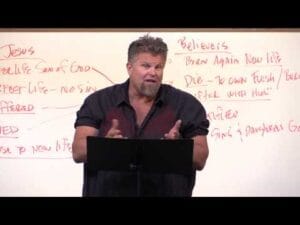
John 11:36-44 Bible Teaching
Communion symbolizes Jesus' sacrifice, meant as a heartfelt act of faith. Post-apostolic age, faith is personal, guided by the Holy Spirit, not strict rituals.

Communion symbolizes Jesus' sacrifice, meant as a heartfelt act of faith. Post-apostolic age, faith is personal, guided by the Holy Spirit, not strict rituals.

Shawn's teaching focuses on personal communion, meaningful faith, and aligning with God's promises. It emphasizes faith's role in life choices, spiritual rewards, and God's favor.

Jesus is the "resurrection and life," offering eternal life to believers. True faith involves repentance and love. Jesus shows divine authority, compassion, and empathy.

Shawn teaches that Jesus' return in 70 AD marked the rapture, unnoticed due to chaos. Believers preserve the world like salt and light. Faith, not law, justifies before God.

Shawn analyzes John 11:11-27, contrasts "soul sleep" beliefs, highlights Jesus as "resurrection and life," explores faith vs. doubt, and emphasizes maintaining faith.

Shawn's teaching focuses on prayer, singing scripture, silent reflection, verse-by-verse Bible study, and Q&A. Salvation is a journey, not instant, realized fully at death.

John's Gospel uniquely portrays Jesus' divine nature, focusing on Lazarus' resurrection to highlight His power over life and death, emphasizing agape love and faith.

Encourages perseverance in faith, recalling past triumphs over hardships, sharing possessions, and maintaining confidence in Christ for eternal rewards, avoiding apostasy.

Jesus' miracles validate His divine nature and unity with God. True Christian faith is shown through love and selflessness, not just doctrine. Jesus' identity as the Son of God is supported by His works and scriptural precedent.

Hebrews 10:26-31 warns of severe consequences for abandoning faith after knowing the truth, urging steadfast belief to avoid judgment. Shawn highlights both physical and spiritual judgments, emphasizing the gravity of rejecting Christianity compared to Judaism. The teaching stresses unwavering faith in Jesus, warning against apostasy and focusing on eternal rewards.

Jesus' life models selfless love, spiritual rebirth, and voluntary sacrifice. Believers follow by dying to self, living by the spirit, and achieving eternal life.

Shawn's teaching focuses on Christ's supremacy, unwavering faith, communal worship, and warns against apostasy, emphasizing active faith maintenance and mutual encouragement.

Jesus, the Good Shepherd, sacrifices His life for followers, earning the Father's love. This act highlights faith and love's interconnection, guiding Christian living.

Shawn's teaching contrasts the Old and New Covenants, highlighting Christ's ultimate sacrifice, faith-based salvation, and direct access to God, emphasizing spiritual completeness.

Shawn's teaching highlights Christ's supreme sacrifice over old laws, emphasizing faith in Christ for true fulfillment. The new covenant removes sin's remembrance, focusing on grace and transformation through faith, not law. Christ's single sacrifice perfects believers, contrasting old sacrifices, and signifies the transition to eternal salvation.

Jesus as the "Good Shepherd" sacrifices for His flock, unites believers beyond ethnic and denominational lines, offering perfect love and guidance unlike human leaders.

Jesus reveals spiritual states, offering enlightenment to the humble and exposing the blind arrogance of others. He is the sole path to salvation, contrasting true guidance with false leaders. True believers follow Him, the Good Shepherd, for abundant life, rejecting those seeking personal gain. Jesus frees from spiritual bondage, emphasizing faith over rituals.

Shawn's teaching highlights the transition from physical rituals to spiritual fulfillment through Christ's sacrifice, emphasizing personal faith, spiritual growth, and readiness for Christ's return.

Shawn's teaching uses John 9's blind man story to show God's grace initiates salvation. It contrasts views on human capacity to seek God, emphasizing divine invitation.

The teaching highlights Christ as the Mediator of the New Covenant, whose sacrificial death redeems sins, contrasting with Old Testament sacrifices, and emphasizes the necessity of shed blood for atonement and eternal inheritance.